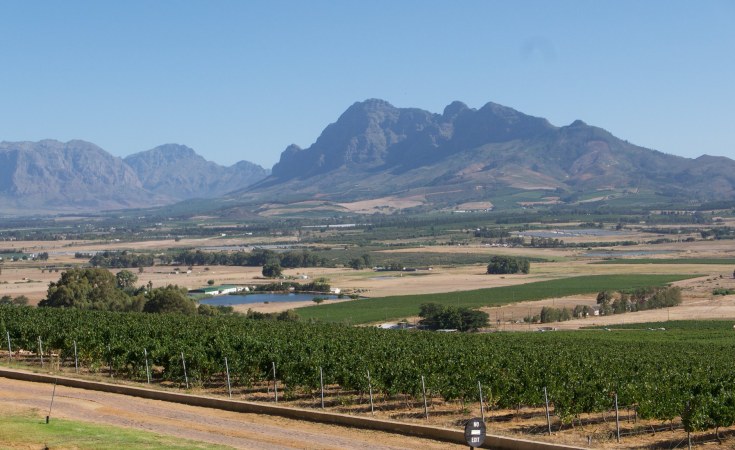Fulgence Kayishema, one of the fugitives most wanted for crimes they committed in the 1994 Genocide against the Tutsi in Rwanda, was arrested on Wednesday, May 25, in Paarl, South Africa.
Paarl, one of the oldest towns in South Africa particularly known for its mountain or Paarl Rock, is a town with 28,5574 inhabitants in the Western Cape province. Located east of Cape Town, on the Groot-Berg River between the Paarl Mountain and the Drakenstein Range, it is the largest town in the Cape Winelands.
ALSO READ: Rwanda welcomes arrest of Genocide suspect Kayishema
Kayishema, a man who committed genocide at his birthplace in the former Kibuye Prefecture, had been on the run for more than two decades.
He, among others, disguised himself as a Burundian national and then as a Malawian.
He used multiple names and aliases.
To evade arrest, all this time, Kayishema, a former head of the Rwandan genocidal government's judicial police in Kivumu Commune in the former Kibuye Prefecture, relied on a network of supporters, including family members, members of the former Rwandan army and FDLR, and those aligned with the Hutu Power ideology.
He is expected to transferred to Rwanda for trial, as per the UN tribunal's decision in 2012.
Kayishema's life
Available information indicates that Fulgence Kayishema was born in Nyange Sector, Kivumu Commune, Kibuye Prefecture in Rwanda in 1959 or 1961. Registered under the name Fulgence Ukiliho, after birth, he later changed his last name to Kayishema. After completing primary and secondary education, Kayishema worked as a teacher in Kibuye Prefecture throughout the 1980s.
In 1990, Kayishema was appointed as the Inspector de Police Judiciaire or Inspector of Judicial Police of Kivumu Commune, a position he still served in by April 1994 when the genocide against the Tutsi in Rwanda began.
ALSO READ: 'Most wanted' Genocide fugitive Kayishema arrested
According to the International Residual Mechanism for Criminal Tribunals (IRMCT), Kayishema directly participated in the planning and execution of genocide in various ways including by procuring and distributing petrol to burn down the Nyange church with the Tutsi inside.
When this plot failed, Kayishema and others used a bulldozer to make the church collapse, thereby burying and killing 2,000 Tutsi who were inside. He and others then supervised the relocation of corpses from the church grounds into mass graves over the next two days.
ALSO READ: Where are the 1,100 Genocide fugitives?
Flying out of Rwanda
At the end of the genocide, in July 1994, Kayishema, accompanied by his wife, their children, and his brother-in-law, and thousands other mass murderers, fled Rwanda to Zaire, now DR Congo, where they were welcomed with open arms.
When the Rwanda Patriotic Army (RPA) took charge in Kigali and stopped the Genocide against the Tutsi, in July 1994, the ousted genocidal regime's army (ex-FAR), politicians as well as Interahamwe militia who orchestrated the Genocide - runaway, en masse, to eastern Zaire.
The Kayishemas stayed in a Congolese refugee camp for a few months before going to Tanzania where they resided in Kigoma.
In early 1995, Kayishema and his family went to Mtabila refugee camp located near Kasulu in Tanzania, where they registered as Burundian refugees.
Kayishema remained in Mtabila camp until about January 1998, when he left for Mozambique. With his family, Kayishema resided in Lichinga for a few months and may have subsequently registered as a refugee at Bobole camp near the Mozambican capital, Maputo.
Using Malawian and Burundian identity
Kayishema and his family then left Mozambique for Eswatini (then called Swaziland) where they claimed asylum and registered as refugees at Malindza/Mpaka refugee camp near Mbabane, in May 1998.
On May 19, 1998, he claimed asylum in Eswatini as a Burundian national, using the alias Fulgence Minani.
His wife was also registered as a refugee using a false identity.
In Eswatini, Kayishema began using the Malawian identity, Positani Chikuse, to regularly cross into South Africa.
Kayishema as a refugee in South Africa
On December 21, 1999, Kayishema travelled to South Africa.
He claimed asylum in Cape Town as a Burundian national, using the alias Fulgence Dende-Minani.
Between 1999 and the present, he primarily resided in South Africa.
In early 2000, he was granted a temporary residence permit in South Africa.
Throughout 2000, Kayishema continued to cross borders between South Africa and Eswatini under the Chikuse identity, to visit his family in Eswatini. In 2001, Kayishema was granted refugee status in Eswatini under the identity, Fulgence Minani, and issued a temporary residence permit.
He later gained refugee status simultaneously in both Eswatini and South Africa. In this period, however, he resided in Cape Town and worked as a car guard at the Blue Route Mall.
Until at least 2006, Kayishema was registered as a refugee in South Africa using the name Fulgence Dende-Minani.
Between 2007 and late 2008, using the alias Positani Chikuse and a fraudulent Malawian passport in that name, Kayishema is believed to have primarily maintained a presence in Mozambique with frequent travels to Eswatini and South Africa.
In March 2009, Kayishema applied for and obtained a South African Life Partnership Visa using a fraudulent Malawian passport under the name Positani Chikuse.
He returned to South Africa at that time and continued living there until his arrest on Wednesday, May 24, 2023, in Paarl just outside Cape Town.
In late 2015, he applied for a renewed visitor's visa in South Africa, again as Malawian national, Positani Chikuse.
By January 2017, the genocide fugitive was granted refugee status in South Africa under yet another alias, Donatien Nibasunba, a Burundian national.
His refugee status was renewed in 2020 for a period of four years.
Kayishema was supported by the former Rwandan army leaders and FDLR elements, who have also abused the asylum process to obtain refugee status in South Africa. To thwart his arrest, they repeatedly provided false statements to South African law enforcement authorities and investigators and provided financial and material assistance to Kayishema and his family members.


